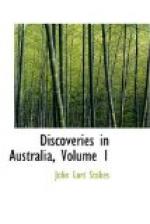We found that Mr. Tyers had made about seven months’ observations on the tides, which gave a very irregular rise and fall, varying from two to thirteen feet. The time of high-water being half past three, at the full and change. Oxide of iron is found in some places in large quantities, and is used by the natives to adorn themselves when dancing. This it is which gives to the coast the peculiar red hue noticed between Cape Croker and Port Essington. Many of the cliffs were composed of a light-coloured marl; but the formation is chiefly old arenaceous rocks. Two of the highest and most remarkable hills on the Peninsula, known as Mounts Bedwell and Rose, have singular flat tops, bearing some resemblance to the curious appearance of Cape Bedford. I am inclined to believe this formation to be floetz trappe. Their elevation is about four hundred feet, being twice the general height of the Peninsula.
RAFFLES BAY.
The temperature during our stay averaged 82 degrees while land and sea breezes prevailed. We should not omit to mention, that Lieutenant Stewart, when visiting Raffles Bay in order to invite the French officers as above alluded to, found that a deep inlet intervening, formed a good harbour, to which he gave the name of Port Bremer. Of the old settlement nothing remained, save the graves of those whose labours had tended to render this part of Australia another outlet for the surplus population of the mother country, extending at the same time the blessings of civilization. The rapid growth of rank vegetation had swept all else away, and there in solemn solitude, upon that still and silent shore, mouldered the bones of the original colonists of Raffles Bay, whose praiseworthy efforts were rendered futile, by the unfavourable reports forwarded to Government; reports we cannot think entirely free from prejudice, when we know from Captain Law’s account, that one of the Commandants declared that he felt disposed to sell out of the army in preference to going there.* One thus prepared to dislike the place, could scarcely be expected to take an interest in the country, or endeavour fully to develop its resources.
(Footnote. See Wilson’s Voyage round the World page 153.)
We cannot avoid expressing our regret at the abandonment of the settlement in Raffles Bay, after it had gone on so far successfully under Captain Barker’s excellent management. In mentioning his kindness to the natives, to whose goodwill we must always owe much, we have already given one of the causes which assisted in fostering the undertaking. Nothing could be more unwise than the hostility shown to the natives by the first settlers, as from them we must always calculate on learning much that is useful and valuable, with regard to the productions of the country; a knowledge which would otherwise consume much time to acquire. This was not the only matter, however, in which he showed his superior good sense and judgment.




